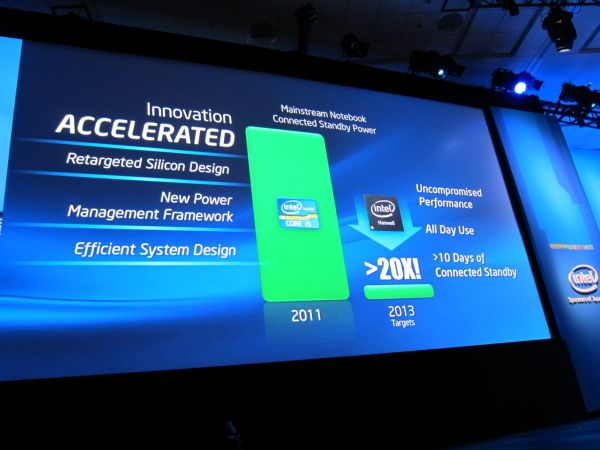Haswell Will Enable 10 Days of Connected Standby Battery Life
by Anand Lal Shimpi on September 13, 2011 12:13 PM EST- Posted in
- CPUs
- Intel
- Haswell
- IDF 2011
- Trade Shows
Intel just announced that Haswell (due out in 2013) was designed to reduce connected standby power by 30% compared to Sandy Bridge. The Haswell platform as a whole will deliver a 20x decrease in connected standby power, which Intel believes will enable connected standby battery life to last up to 10 days. The idea here is to be able to put your notebook to sleep and have it continually fetch cloud updates (email, IMs, tweets) for up to 10 days on a single charge.











4 Comments
View All Comments
vlado08 - Tuesday, September 13, 2011 - link
Anand I need some more explanation. What am I missing?MilwaukeeMike - Tuesday, September 13, 2011 - link
Good question... what I was able to gather was that the PROCESSOR will use 30% less power. While the entire PC that runs this chip will have a 20x decrease. Its confusing to me to use multiplication to make something smaller and I assume that means the Haswell system (not just the chip) will use 1/20th the amount of power on standy as a Sandy Bridge system.ajp_anton - Tuesday, September 13, 2011 - link
So if the whole platform (CPU+chipset) can be decreased by 20x, while the CPU itself only goes down 30%, it means that currently the Sandy Bridge platform excluding the CPU is using as much power as 20 Haswell platforms (excluding CPU) plus 13 Sandy Bridge CPUs.ssj4Gogeta - Wednesday, September 14, 2011 - link
Why would you want your notebook to continually fetch updates, instead of just updating in one go when you wake it up? Unless we're talking about some kind of updates notification here like in smartphones.